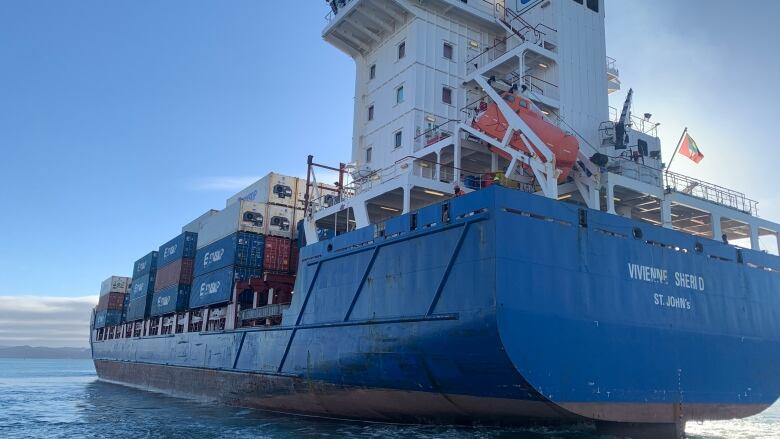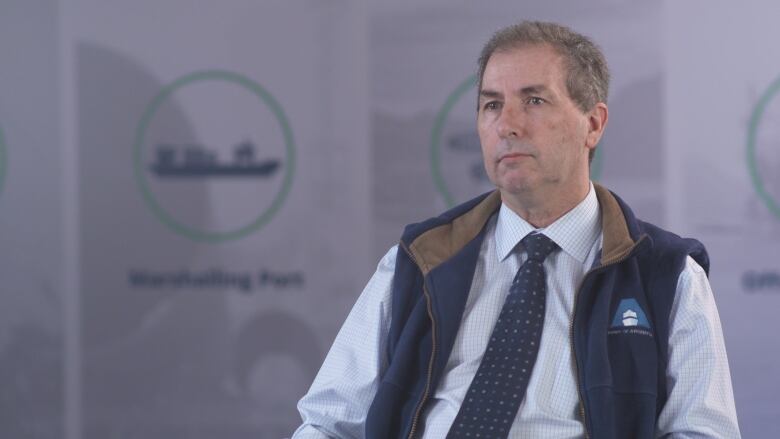How a post-9/11 cargo screening rule means N.L. consumers may pay more, wait longer for goods
Containers from international ports now have to land first in Halifax, not Argentia

There are concerns that recent changes to the enforcement of international marine cargo screening rules will hurt Newfoundland and Labrador's economy and siphon more cash out of the pocketbooks of people in the province.
"If you're getting a laptop that you're purchasing from overseas somewhere, it might be $1,000, and now with all these extra segment costs, it might be $1,200 for the consumer to buy," Chris Newhook, general manager at the Port of Argentia, told CBC News.
Containers coming from international ports into Canada have to be taken off ships and screened for radiation. That requirement is part of a suite of post-9/11 anti-terrorism measures aimed at bolstering security. (It doesn't apply to cargo from the U.S., which is pre-screened upon departure.)
There is no scanner to do that in Argentia, but that wasn't an issue for years until a recent decision by the Canada Border Services Agency.
"Eimskip has been calling to Argentia since 1989 and they were not impacted by the introduction of this," Newhook said, referring to the international shipping firm.
"So whether it was smaller volumes or whether it was just an overall risk assessment, that was not introduced for the calls to Argentia."
But now it is. CBSA says cargo ships from international ports can't use Argentia as the first port of entry.
Instead, they must go to a port with the scanning technology usually Halifax, which is one of only five sites with the equipment in the country before making their way back to Newfoundland.

Newhook said the decision "is going to be a significant thing for our local economy and our consumers and businesses," meaning extra travel time and added costs to be borne by shipping companies.
'Many companies going to be impacted'
A Newfoundland seafood company says those extra costs are being passed down the line to them and others.
"There are many companies in Newfoundland, in other parts of Canada, that are going to be impacted by this charge," said Alberto Wareham, president and CEO of Icewater Seafoods.
The company, based in Arnold's Cove, employs 200 people. Wareham says they operate the only fish processing plant on the continent with a year-round focus on North Atlantic cod, producing premium products for customers in Europe and North America.
He notes that they are importing about 100 containers of raw material to supplement their local supply of cod, and new charges linked to the decision are costing about $56,000.
Not only that, Wareham is concerned that the situation could lead international cargo carrier Eimskip to question the viability of its service in Argentia something that could impact their export business, in addition to their import business.
"Our customers are used to weekly service out of Argentia, in and out of Argentia, and we can supply our customers in Europe with two weeks' notice," Wareham said.
"They're used to that now. We've built our business on that, and I hope we can continue to have that."

In a statement, Eimskip expressed concern about the current circumstances.
"Throughout the years we have had good co-operation with the Port of Argentia and other service providers in Newfoundland," Asa Linda Egilsdottir, the managing director for Eimskip Canada, wrote in an email to CBC News.
"The CBSA's decision has created complications and additional cost, and we hope that the relevant authorities will resolve the issue quickly and efficiently so we can continue to offer our good service in Argentia."
CBSA says screening is 'critical' requirement
CBSA declined interview requests from CBC News.
In a statement, the agency stressed that it is committed to deliver on its safety and security mandate while ensuring the fluid movement of goods through the global supply chain.
"This includes the commitment to fulfil our mandated international and national requirements for marine container screening, examination processing and security agreements, including radiation detection," spokesperson Maria Ladouceur wrote.

Ladouceur indicated that an internal evaluation of commercial clearance processes in Newfoundland brought to light an increasing number of marine containers arriving in Canada at marine ports not equipped with radiation screening equipment.
"It is critical to ensure obligations to screen containerized cargo for the presence of radiation are met," Ladouceur noted.
"Impacts to the Canadian economy are top of mind, and the CBSA understands and shares the desire to find solutions when it comes to the cost and delays borne by importers."
Ladouceur said the agency is working with the Port of Argentia and other local stakeholders "to ensure the continued protection of Canadianswhile supporting the Canadian economy."
Lack of solution could have 'dramatic' impact
Back in Argentia, Newhook says he has no issue with the security protocol being enforced.
But he says they were hoping for a grace period to comply and they are lobbying to have a scanner installed at the port.
If there is no solution, Newhook said, the impact could be "dramatic" on projects that are in the works.
"It's not just about today, it's about the years to come. And we're looking at, for example, the wind turbine industry," he said.
"If that industry takes off, there's going to be a lot of material coming into the province. And if all of that has to go to another province and then come back, it's really going to be a significant cost increase to the economics of doing these projects on site."

He said the required investment is not that muchwhen stacked up against the alternative.
"While it might be a couple [of million] or $3 million of equipment and the folks to run it, it's our whole provincial economy that's being choked by not being able to have that facility on site," Newhook said.
"So we believe there's a strong case."












_(720p).jpg)


 OFFICIAL HD MUSIC VIDEO.jpg)
.jpg)



























































































